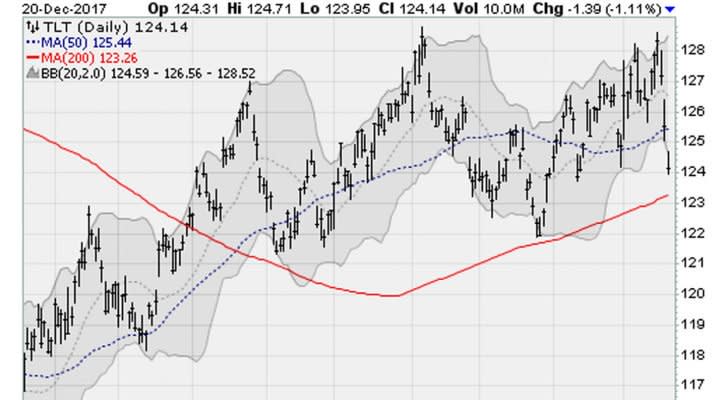New Year Will Bring New Anxiety to the Markets
The passage of the GOP’s tax cut plan through the Senate — and the House, for a second time — was met with a collective shrug of the shoulders on Wall Street, capping the worst two-day performance for stocks and bonds in 2017.


Long-term Treasury bonds were hit hard, ostensibly on concerns the fiscal stimulus push will push inflation higher and thus interest rates higher by forcing the Federal Reserve to quicken its policy tightening pace. In fact, the yield difference between two-year and 30-year bonds steepened at a pace not seen since January 2009.
In the end, the Dow Jones Industrial Average lost 0.1%, the S&P 500 lost 0.08%, the Nasdaq Composite lost a fraction and the Russell 2000 gained 0.2%.
InvestorPlace - Stock Market News, Stock Advice & Trading Tips
Energy stocks led the way, with ConocoPhillips (NYSE:COP) up 3% and Halliburton Company (NYSE:HAL) up 3.4%. Utilities, media stocks and retailers were among the laggards.

It’s becoming clear all the good tax news has been priced into stocks over the past year. Indeed, with the final GOP bill apparently set to become law, a “sell-the-news” dynamic is now setting in, with U.S. equities moving lower following reports that the tax plan could actually hit the foreign profits of tech giants like Microsoft Corporation (NASDAQ:MSFT).
In a special report to clients, Barclays Capital analyst Maneesh Deshpande and his team calculated that the benefit is less than it appears: While the statutory corporate tax rate is set to fall from 35% to 21%, the effective rate for S&P 500 companies (the rate companies actually pay after all the accounting trickery) is set to fall from 26% to 20.7%.
That’s good. But hardly earth-shattering. As a result, Deshpande believes the cuts will have “limited supply-side effects and, therefore, believe it is unlikely to lead to potential long-term growth.” Barclays estimates the lift to companies’ 2018 earnings-per-share to be about 8.1% — reduced to around 6.3% after accounting for items like one-time repatriation costs and deferred tax liabilities and assets.
Compare that to the near-30% gain the S&P 500 has enjoyed since last November.
Conclusion

It’s clear that the point of stress that is likely to push markets into a long delayed correction will come from the bond market. Both Treasury bonds and corporate high-yield bonds are showing price weakness here, something investors are largely ignoring focusing their attention on Bitcoin and big tech stocks instead.
That should soon change as we pass the holidays and the calendar flips to 2018. Next year features many headwinds: Mid-term elections and the specter of Democratic gains in Congress, a more aggressive rate hike path from the Fed (with a new chairman at the helm), further turmoil in China and the appearance of inflation here at home.
Check out Serge Berger’s Trade of the Day for Dec. 21.
Today’s Trading Landscape
To see a list of the companies reporting earnings today, click here.
For a list of this week’s economic reports due out, click here.
Tell us what you think about this article! Drop us an email at editor@investorplace.com, chat with us on Twitter at @InvestorPlace or comment on the post on Facebook. Read more about our comments policy here.
Anthony Mirhaydari is the founder of the Edge (ETFs) and Edge Pro (Options) investment advisory newsletters. Free two- and four-week trial offers have been extended to InvestorPlace readers.
More From InvestorPlace
The post New Year Will Bring New Anxiety to the Markets appeared first on InvestorPlace.
